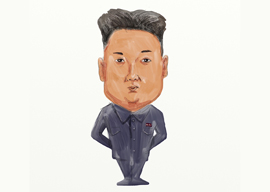
April 07, 2017

Kim Jong-un
Source: Bigstock
Harry Truman was in the White House and Donald Trump hadn”t yet been conceived when atom bombs were dropped on Hiroshima and Nagasaki. Truman was still there and the Donald had just celebrated his fourth birthday when 75,000 North Korean troops invaded South Korea. The war launched then has never formally ended. There has been no peace treaty. Now we may be on the brink of a new Korean War”unless President Trump can persuade China’s leader Xi Jinping to rein in the North Korean dictator Kim Jong-un. China can do so, for the North Korean regime depends on China for its survival. So it should be easy for China, but Mr. Xi has two worries. First, he fears the collapse of the regime, which might lead to the reunification of Korea, and China values North Korea as a buffer state. Second, President Trump’s warning that, if China doesn”t solve the North Korea problem, “we will,” may make it difficult for Xi to act without losing face. So President Trump should try to make it as easy as possible for him to do so by making a deal from which China can emerge as the savior of the world from nuclear war.
No nuclear weapons have been used in anger since 1945. The Cold War never turned hot; it was played out at arm’s length only by proxies. MAD”Mutually Assured Destruction”prevented madness. Moreover, though there are now too many members of the nuclear club for comfort, MAD still rules. But North Korea has nuclear weapons and is getting to the point where it may be able to launch a missile with a nuclear warhead that is capable of reaching the United States. Worse still, there are fears”which may or may not be well-founded”that Kim Jong-un’s loathsome regime may be crazy enough to ignore the reality of MAD and launch its missiles.
On the other hand, it may not. The third-generation Kim is a nasty bit of work and his regime an antechamber of hell, but he may not be suicidal. On the contrary, he gives the impression of enjoying his power and relishing his life. He is certainly playing a dangerous game, but it may only be a game.
At this point one may observe that throughout the Cold War, and indeed since, the word “nuclear” has been an adjective regularly followed by the noun “deterrent.” The possession of a nuclear arsenal protects you from attack by any hostile power, and from the perspective of Pyonyang, both the USA and South Korea are just that: hostile powers of which the regime is afraid.
It is easy to assume that states like North Korea and Iran that we regard as our enemies want nuclear weapons in order to make war. Sometimes their language seems to justify this assumption, the former Iranian president Mahmoud Ahmadinejad’s bloodcurdling threat to wipe Israel off the map being a case in point. Yet the corollary of this assumption is that they are essentially different from every other state that has acquired nuclear weapons and has done so for reasons of security, as a deterrent to states they perceive as hostile. The first assumption may be correct, but it may not. Anyone who knows anything about the Cold War knows that the Soviet Union was every bit as afraid of the USA as the USA was of the Soviet Union. In retrospect we can see that on both sides the arms race was all about bolstering or fortifying the concept of MAD.